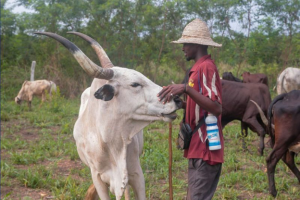GAMBIA( AP)-The joyful sound of traditional drums, young boys are dressed in white woods, a traditional ceremony is taking place.
This is the coming-of-age ceremony, which includes a mysterious character – the Kankurang.
A custom handed down from generation to generation in this community in Gambia.
Despite the fearsome appearance, the Kankurang is considered a protector against evil.
Mamadou Jallow, head of the ceremony believes the spirit (Kankurang) provides order and justice.
“We don’t have that kind of knowledge (power) to disappear and so on (as a real Kankurang has). Now, we make this Kankurang, somebody put it on, masked, and just display something, putting these two cutlass (machetes) on top. Because evils, they are afraid of it (of the Kankurang, considered a protector spirit) so maybe when we put it (Kankurang) out, they (evils) will think it’s a real one, they will be afraid.
The Kankurangs appear at ceremonies where circumcised boys are taught cultural practices, including discipline and respect.
They are followed by a small procession of teenagers and young men who are accompanying four young boys nearing the end of a month-long initiation rite, which is practiced by the Mandinka ethnic groups in Gambia and neighboring Senegal.
The Kankurang tradition has since spread to other groups in the region — including Wolof, Fula and others — despite it been recognised by UNESCO it is at risk of disappearing because of land development.
“When I had my circumcision ceremony), they (the men in charge) sang nice songs, they trained me how to sing, they trained me how to handle people, they trained me how to respect people. This is the place where we trained them. How to respect people and how to respect elders and so on.”
The rite ends with a day of celebration in which families, friends, and neighbors gather for the presentation of the newly initiated boys.
Wearing collars made of candies and money bills, each boy dances in front of the crowd.
Relatives and neighbors put small amounts of money in a bucket as a sign of gratitude, to be shared with those who took care of them during their coming-of-age passage.
The Ethiopian Herald October 29/2021



